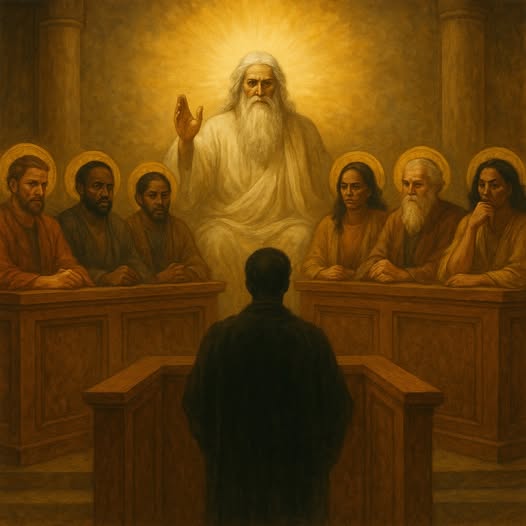
Every generation must wrestle with a foundational question: Where do our rights come from? Are they granted by kings or constitutions? Earned by the powerful or secured by majority vote? According to the biblical worldview, the answer is none of these. Our rights come from Yahweh, the Creator of Heaven and Earth. To suggest they originate from human authority is not only false, it is blasphemous. It denies the Creator’s role, rejects our identity as His imagers, and places man on a throne that belongs to God.
Imagers of Yahweh: The Source of Human Dignity and Rights
Genesis 1:26–27 declares that humanity was created in the image of God. This status is not abstract theology; it is the foundation of human dignity, moral agency, and inalienable rights. As tselem Elohim, or image-bearers of God, we were designed to reflect His justice, creativity, and authority into creation.
These rights are not privileges handed down by human rulers. They are built into our identity. A just government can recognize them, but it cannot invent, redefine, or revoke them without attempting to overrule the divine order.
Psalm 82: A Warning to Overreaching Authorities
Psalm 82 gives a powerful warning to rulers, both spiritual and earthly, who abandon justice and seek divine status for themselves. Yahweh stands in the midst of the divine council and declares:
“How long will you judge unjustly
and show partiality to the wicked?
Give justice to the weak and the fatherless;
maintain the right of the afflicted and the destitute.” (Psalm 82:2–3)
These elohim—spiritual beings set over the nations after Babel (cf. Deuteronomy 32:8)—were supposed to govern in service to Yahweh’s justice. But they became corrupt, turning authority into domination and stewardship into self-exaltation.
God’s judgment is clear:
“You are gods,
sons of the Most High, all of you;
nevertheless, like men you shall die,
and fall like any prince.” (Psalm 82:6–7)
Even divine beings are not above accountability. When rulers, spiritual or human, begin to claim what is Yahweh’s, they are sentenced to judgment and death. This psalm is not just a critique of heavenly rebellion. It is a warning to every earthly power that seeks to elevate itself above the boundaries of its commission.
God-Ordained Government: Good When Restrained
It is vital to understand that government itself is not evil. Scripture makes clear in Romans 13:1–4 that governing authorities have been instituted by God to uphold justice, reward good, and punish evil. When functioning within their God-ordained limits, governments are a blessing, a mechanism to restrain sin, protect the weak, and preserve order.
“For rulers are not a terror to good conduct, but to bad… for he is God’s servant for your good.” (Romans 13:3–4)
But government is a servant, not a source. It is a minister, not a maker of rights. When it forgets this and begins to act as a god, declaring what is right and wrong apart from Yahweh, redefining humanity, or demanding worship in the form of absolute obedience, it follows the path of the rebellious elohim in Psalm 82.
The Blasphemy of Rights by Government Decree
To say that rights come from government is not a neutral civic claim; it is theological theft. It denies the Creator and elevates human authority beyond its limits. In doing so, it commits a form of blasphemy by attributing to man what belongs only to Yahweh.
This is the great danger of modern political ideologies that redefine liberty, marriage, life, speech, and even identity based on the will of the state. These are not new visions of justice; they are echoes of Psalm 82’s corruption.
A Battle of Allegiances
This is not just a political issue, it’s a matter of worship. Who defines right and wrong? Who gives life value? Who has the final authority? If we answer with “the state,” then we have bowed to a false god.
Believers must remember that we are citizens of a higher Kingdom. Our allegiance is first to Yahweh. While we are to honor legitimate government, we are also called to oppose any authority that claims divine status by redefining what God has already declared.
Conclusion
Psalm 82 ends with a cry that echoes across time:
“Arise, O God, judge the earth;
for You shall inherit all the nations!” (Psalm 82:8)
Yahweh is the true and final Judge. All powers, spiritual and earthly, will answer to Him. As His imagers, we are to reflect His truth, proclaim His justice, and resist the lie that our rights come from anywhere else.
Governments matter, but only when they know their place. Our rights are not permissions granted by rulers. They are divine gifts. To deny this is not just wrong. It is blasphemy.
Discussion Questions
- How does Psalm 82 illustrate the dangers of authorities claiming divine status?
- Why is it important to distinguish between government as a servant versus a source of rights?
- What happens to human dignity when governments redefine what it means to be human?
- How can Christians honor legitimate government while resisting blasphemous claims of sovereignty?
- What are some modern examples of governments stepping beyond their God-given role?
Want to Know More?
- Stephen Wolfe, The Case for Christian Nationalism
Explores how Christian doctrine might inform national identity and governance. While controversial in tone and scope, the book raises important theological questions about the relationship between divine authority and political order. - Francis Schaeffer, How Should We Then Live?
Traces the philosophical and spiritual decline of Western civilization, arguing that the rejection of biblical truth has led to moral collapse and political overreach. A powerful defense of Scripture as the foundation for human dignity and freedom. - Robert P. George, Conscience and Its Enemies
A collection of essays addressing the erosion of religious liberty, moral reasoning, and human dignity in modern political discourse. George defends the role of conscience and the limits of state authority from a biblically grounded natural law perspective. - John Stott, Issues Facing Christians Today
Provides a balanced Christian approach to social, moral, and political issues, including how believers should relate to government while maintaining allegiance to God’s higher authority. - Wayne Grudem, Politics According to the Bible
Presents a comprehensive biblical framework for evaluating modern political issues. Grudem affirms that governments are ordained by God but must never usurp the rights and dignity Yahweh has given to humanity.




